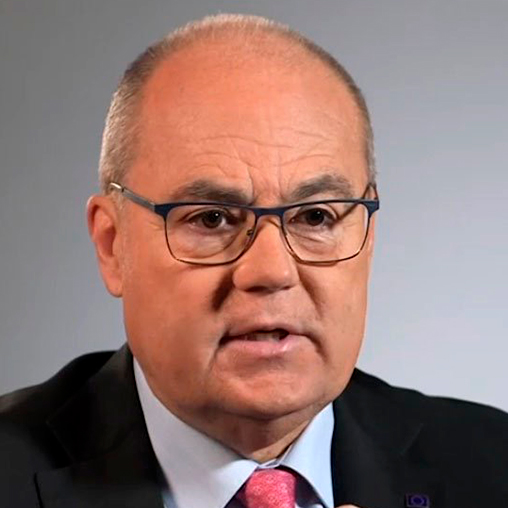
Teresa Bau
Dr Antoni Trilla is one of the best known and most respected epidemiologists in Catalonia. During the COVID-19 pandemic, he was one of the experts who appeared in the media to explain to a concerned public how the virus was evolving and how we could protect ourselves. Trilla is head of the Preventive Medicine and Epidemiology Service at Barcelona's Hospital Clínic. He is also a professor of Public Health and dean of the Faculty of Medicine and Health Sciences at the University of Barcelona, as well as an ISGlobal researcher and a member of the eHealth Center's Advisory Board. We interviewed him to find out how digitalization will affect the medical profession and the quality of care in the future.
What opportunities do you see for the development of digital solutions for health, especially in epidemiology and preventive health?
It's an area with great potential for development, both in preventive health and health promotion and in epidemiological surveillance and control. For example, we can use digital solutions for the vaccination schedule of children and adults, to remind people that they should exercise, to identify vectors (like mosquitoes), to record data that can help identify and control epidemics, and so on.
As dean of the Faculty of Medicine and Health Sciences at the University of Barcelona, do you think students are receiving proper education in health digitalization?
We need to educate them better. They're obviously more prepared, and in many areas they're advanced digital users, but the specific health aspect must be reinforced and made attractive to them. Today's students work and communicate in a much more digital way. Sometimes, in the classroom, we only see students' open laptops rather than their faces... In turn, artificial intelligence is already entering the academic and teaching world, and we must use it in a positive way.
What are the main challenges in implementing digital solutions in healthcare?
In my opinion, they need to be shown to be reliable, safe and scientifically proven before considering their potential use in real life. And, once this is done, they need to be simple and easy to use.
Do you think people are ready for a more digital healthcare?
We're already in a context of more digital healthcare. The experience with La Meva Salut (the Catalan health service's online and mobile app), for example, is very positive. And let's not forget the digital Covid vaccination certificates that we all rushed to download onto our mobile phones in case we were asked for them when travelling or entering certain places.
And what about health professionals? Are they prepared for these solutions?
The medical profession is always trying to use the best technology available, for example for diagnosis or communication. But we also hope that digital solutions really are solutions. These can include other aspects that don't add value to our work – for example, solutions that simplify bureaucratic or administrative tasks such as collecting clinical data, summarizing medical records or transcribing clinic notes.
One of the main complaints from entrepreneurs is that it's hard to get health systems to adopt their innovations. How do you think this challenge can be overcome?
To be honest, I don't know for sure. There's always some resistance to change, and the world of digital health is complex and still suffering from birth and growth defects: incompatible systems, decisions made by tech experts or managers that are not first analysed or tested in the everyday real world...
What do you think the role of the eHealth Center should be in terms of digital health solutions?
The eHealth Center is a very sound initiative. It should play a crucial role in identifying challenges, seeking potential solutions and, most importantly, methodologically validating them in order to recommend or discourage their use in clinical practice.
As head of Epidemiology and Preventive Medicine at Hospital Clínic, what do you think are the most important digital innovations carried out at the hospital in these areas?
We rely a lot on data. Eighty per cent of our work is analysing data. When I first started out in medicine, requests for medical tests were made with pen and paper, and the results arrived on paper the next day. Now everything is digital and much faster. A lot of data of all kinds is generated. Computer systems are good and sound enough, but they're still not sufficiently friendly or easy to use. Now we have real-time information and can access data much faster, but I think everything should still be much more automated (wherever possible) and easy.
You were one of the leading epidemiologists during the Covid pandemic. What do you think about the fast-paced digitalization that took place during that period?
There were two major areas of acceleration. The first involved data collection and analysis, both epidemiological data (surveillance, predictive models) and clinical data (predictive risk assessment), and treatment (pragmatic clinical trials). The second was the use of digital communication between professionals and patients. Many of these innovations have been adapted and are now with us for good.
What innovations do you think we will see in the short to medium term?
We'll carry and access all personal health information on mobile devices; the use and accuracy of wearable health monitoring devices will increase; and we'll communicate with patients and professionals through increasingly secure and efficient digital means. Artificial intelligence will make great strides in this field and will help offload many administrative support tasks. We'll have a lot of information at our disposal, which will have to be managed well, especially in terms of knowing how reliable it can be as a tool to support clinical and epidemiological decisions. And one thing is certain: thanks to technology, we doctors will have more time to care for patients, to talk to them and to contribute the skill, experience and empathy that form part of the values of our profession.
